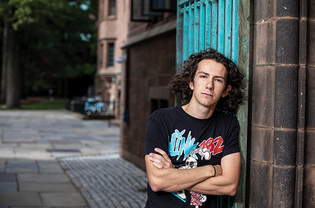
Bob Handelman
Nico Zani
Dana Point, CA
PhD in Applied Physics
Do people understand what applied physicists do?
I suppose a lot of people think physicists [only] do fundamental research into the laws of nature, but there’s a lot of physics that’s actually around building things—building devices better. When I tell people I’m studying physics, they’re generally impressed. That’s often where the conversation will end, because people are worried they aren’t going to understand.
What is your area of research?
I do research into quantum computing and information. One of the main focuses here [at Yale] is looking into different kinds of qubits [quantum bits] that can be made.
What’s a qubit?
Classical computing is based off of a binary: ones and zeroes. Each piece of information is a statement, so whatever that bit represents is either zero or one. A qubit adds properties to that fundamental bit, those properties mainly being that a bit can be in both a zero and a one state. Really, qubits allow probability and interdependence to enter fundamental operations that happen in a computer.
Here, a lot of research is devoted to superconducting qubits and either improving on current designs, improving the ways they interact, or creating new designs that have different desirable qualities.
Will you take any courses outside of your field?
I’m definitely interested in courses in other departments. Statistics, if that counts. And maybe philosophy. I’ve done my best to read about it independently but haven’t gotten any formal education in it.
What’s been fun so far?
Going to Gryphon’s [the Graduate and Professional Student Center pub] is a bunch of fun. Just throw that in there, and maybe I’ll get free drinks.
____________________________________________________________
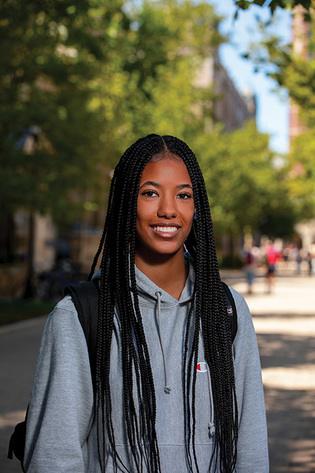
Bob Handelman
Sosna Biniam ’26
Seattle, WA
Silliman College
Would you describe a class you’re enjoying?
Biology, the World, and Us. We’re learning about the biology of infectious diseases, but it’s not for STEM majors. We focus on a surface-level understanding of the biology of diseases and then we talk about the social impacts of those diseases: why they have spread the way they have, and the impact on the spread of the government’s decisions. For example, we just learned about polio and how, once the vaccine was created, polio in certain communities kept spreading. It was super interesting to me.
Do you have a major in mind?
I’m pretty much as undecided as a person can get! I’m thinking of maybe a certificate in computer science because it’s a very technical skill. Currently I’m in an economics class, so I’m considering econ as a major. I’m also in a statistics class, which is where I’m heading now, because I’m thinking about statistics and data science. I’m also taking Literature and Social Justice in the English department. I’m considering attending law school after undergrad, so I might choose a humanities major.
You are exploring a lot. That’s fun.
I don’t think there’s a lot of us who are outwardly undecided—who talk about being interested in a ton of things. That part of it has been an adjustment for me.
What extracurriculars appeal to you?
I’m currently involved in the Salus Populi Foundation on developmental economics. I am the publicity chair for Yale’s Eritrean and Ethiopian student association. I’m in STAY—Students and Alumni of Yale. And I’m thinking of intramural volleyball or basketball.
_____________________________________________________________________
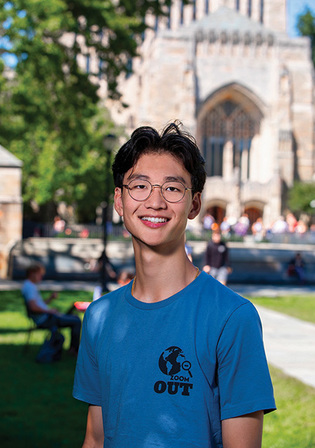
Bob Handelman
Steven Dong ’26
Calgary, Canada
Benjamin Franklin College
Why did you choose to study in the US instead of Canada?
One of the main things is the liberal arts education here. Instead of pigeonholing yourself into one very specific field of study, here you can explore a wide range of classes before you settle down. You only have to declare your major after the second year.
So I know a lot of STEM majors who are taking humanities first-year seminars. They’re taking history classes, they’re taking language classes: all things that would be a lot more difficult—and are certainly not encouraged—in Canadian universities. Here we have distributional requirements that force you to take quantitative reasoning classes, writing classes, and language classes as well.
What are your interests?
Originally I was going to be a history of science, medicine, and public health major. Now I’ve talked to a few of my counselors, and I think it’s feasible to do a double major if I put in the work. So now I’m looking at computer science and economics plus history of science, medicine, and public health. That would be a BS and a BA.
Did you take part in a preorientation program?
I was going to do the international students one, but I tested positive for COVID as soon as I got here. So, I missed my orientation. I was isolating in a building specifically for people who have COVID.
Oh no! Did you make friends there?
Yes. I was asymptomatic, and there were a lot of asymptomatic people there, so we were free to hang out. We called it our own COVID orientation group.
___________________________________________________________________
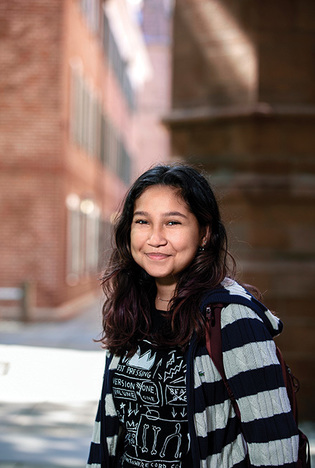
Bob Handelman
Isabella Barboza ’26
Chicago, IL
Branford College
What’s your academic focus?
I applied as a history major, and I’m pretty sure I’m going to stick with that. I like seeing how events have led up to each other. You can see patterns across cultures or across time, and causes and effects can be similar, or vastly different.
Are you drawn to studying a particular region or era?
During high school I took a course on Latin American history, post-independence, and that was really interesting. I might explore that further.
What are you looking forward to in the next few days?
My first-year seminar. We just read [Plato’s] Symposium. The topic was “What is love?” and different aspects of love. It’s discussed in the Symposium how, once you find a person, that love can lead you to desire truth and infinite knowledge. It was kind of complicated—I won’t lie.
Do you have plans for extracurriculars?
At the moment, I’m interested in the Yale Prison Education Initiative. In terms of volunteering, I was thinking of Matriculate, [a nonprofit] which helps juniors and seniors in high school with the college application process. Also, I’m exploring New Haven and seeing what else there is besides the Yale bubble.
What do you miss from home?
In Chicago, there’s a lot to do, whenever you want to do it. New Haven isn’t a small city by any means, but there’s a big change in the pace of things. And I miss my family a lot.
How do you keep in touch?
I’ve been calling and texting them, with a FaceTime every once in a while.
__________________________________________________________________
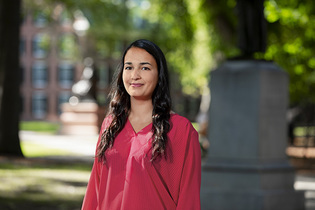
Bob Handelman
Paulina Prasad
Master in Public Policy,
Jackson School of Global Affairs
Sonoma, CA
What aspects of public policy interest you?
I’m very concentrated on the way that middle-income countries on their path to infrastructure development can implement policies that incentivize companies or governments to use more sustainable technologies, both in mitigating the effects of climate change and in adapting to predicted shocks.
For the past three-and-a-half years I was living in Ecuador. Originally I was a Peace Corps volunteer and teaching English in the Amazon. Unfortunately, that was cut short because of COVID. Then I worked [in Quito] for a company that does environmental compliance monitoring for USAID food security projects.
The Jackson Institute officially became the Jackson School this summer. What’s it like being in the first class?
This semester I’ll be taking all Jackson courses: three core courses—applied statistics, fundamentals of economics, and comparative politics—and a course called Managing Clean Energy Transition. I feel like that class was almost made for me, in terms of the course description and also because the professor has a lot of experience in Latin America. When I emailed him, he responded in Spanish and told me that his two daughters were born in Ecuador!
I should also mention that I’m not Latina. My dad was born in Fiji. With my climate focus, grad school is going to be a great opportunity to learn about myself and my background and Fiji’s place in the world, and about clean energy policies we can implement to protect small islands. There’s actually an overlap that hasn’t really been explored between Fiji and Ecuador, because Ecuador has the Galápagos Islands [and Fiji is an island country], so a lot of their climate interests are similar.
____________________________________________________________________
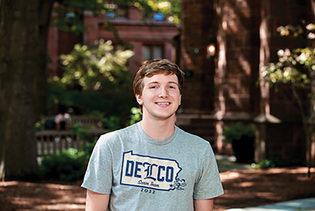
Bob Handelman
Zach Scullin ’26
Trumbull College
Havertown, PA
What subjects do you like most?
In high school, I was mostly a STEM kid. I went ahead in math, and I really liked physics. I liked it so much that I think I want to be a mechanical engineering major, using those principles of math and physics to solve problems and help people. I also like humanities and liberal arts, which is awesome, because there are literally thousands of liberal arts classes. This semester I’m taking a first-year seminar on the roots of the American Revolution. My dad’s a high school history teacher, and he’s super happy that I’m taking an American history course. My other courses are linear algebra, intensive introductory physics, computing for scientists and engineers, and a physics lab.
What’s your favorite so far?
Definitely physics. It’s a very proof-heavy class. So we’re doing a lot of math with variables and symbols. It’s a bridge between the disciplines of math, calculus, and physics. It all comes together in one big picture.
Yesterday in class we derived Kepler’s Second Law of Planetary Motion. When a planet is in orbit it will cover an equal amount of area in an equal amount of time, no matter where the planet is on its orbital path. The planet can follow a weird wacky path, and the ratio of the area covered to the time traveled is always constant. I think that’s really cool.
How are you spending time outside of your studies?
I’m exploring the social scene, hanging out with friends, eating meals with other people. I just joined the club water polo team, which is cool, since I swam in high school. All the dudes on the team are chill. I’ve never played water polo before, so it’s a new experience.
_____________________________________________________________________
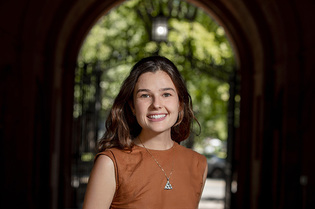
Bob Handelman
Josie Watson
Master of Environmental
Management, School of the Environment
Old Greenwich, CT
What have you been doing since finishing college?
I graduated from Tufts in 2018 and worked on soil health policy for the United Nations for a year. Then I did similar policy work at the state level, in the Northeast. I also earned my JD at Vermont Law School as part of a joint program with the Yale School of the Environment.
What will be your focus at the School of the Environment?
I’m interested in commons management studies. It’s a field launched by social scientist Elinor Ostrom [who pushed back against the argument] that private property rights are the ultimate solution for natural resource management. Britain’s legacy is the enclosure movement—powerful people privatizing land to extract from it and maximize their personal wealth. Ostrom wanted to refresh our cultural memory: before that economic model evolved, as a species our culture was really specific to place. Communities had deep relationships with our land, and local communities collectively governed commons resources to meet every individual’s needs.
Nowadays, can a local community sustainably manage its resources?
Right now we have this illusion that our government is populated with experts that have the data needed to make decisions for the American people. Working for [agricultural] agencies, I’ve come to understand that they’re just working at too high a scale to fully understand what’s going on in ecosystems at ground level. Rather, people who are rooted in commons have the expertise to make these decisions. Community members understand how their community needs to eat; they understand what’s going on with water; they understand what’s going on with species in their environment.
Which of your courses are you particularly excited about?
A class on land-use law and tribal sovereignty. We’re going to study partnerships between tribes and state land-management agencies.
 loading
loading